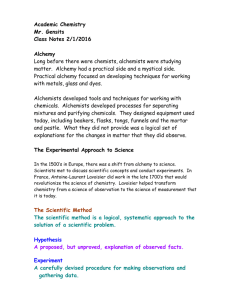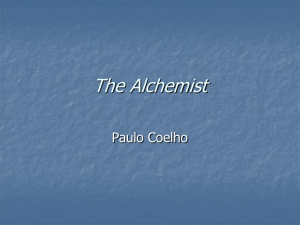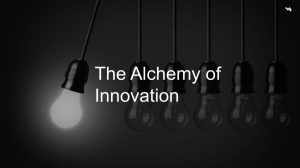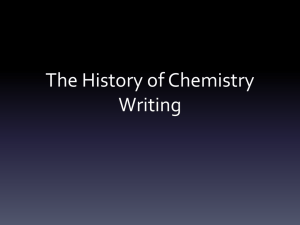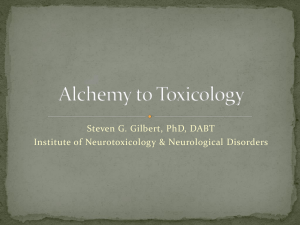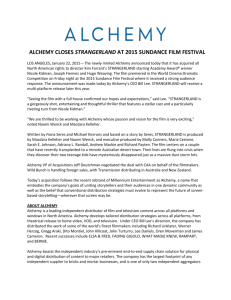Alchemy to Toxicology
advertisement
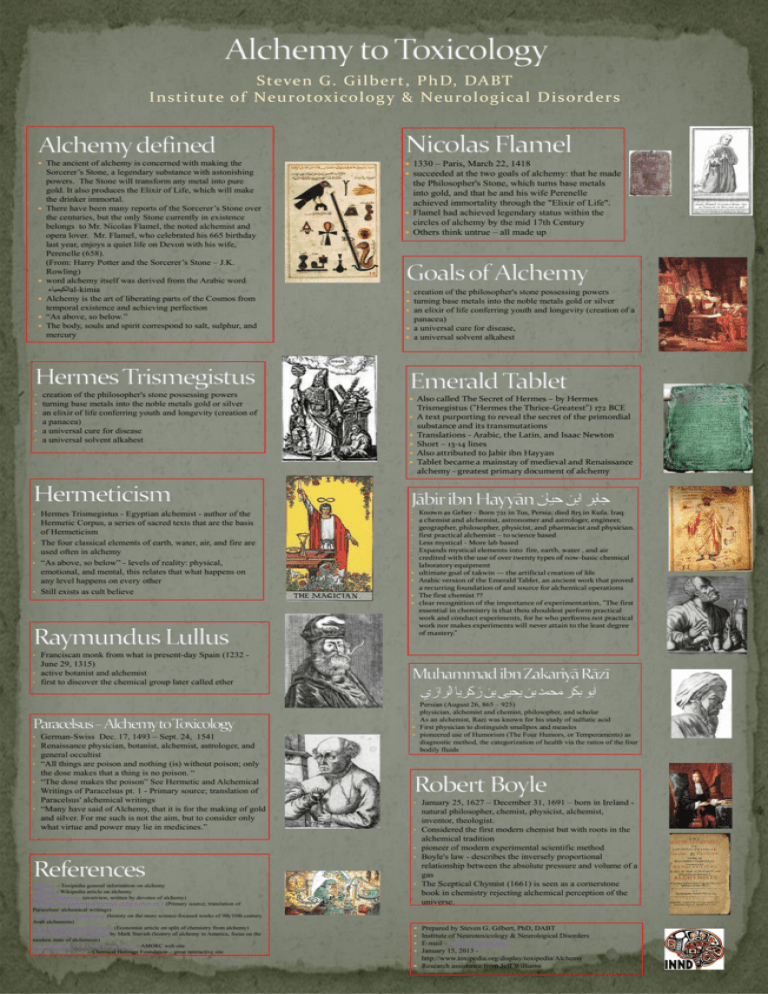
Steven G. Gilbert, PhD, DABT Institute of Neurotoxicolog y & Neurological Disorders The ancient of alchemy is concerned with making the Sorcerer’s Stone, a legendary substance with astonishing powers. The Stone will transform any metal into pure gold. It also produces the Elixir of Life, which will make the drinker immortal. There have been many reports of the Sorcerer’s Stone over the centuries, but the only Stone currently in existence belongs to Mr. Nicolas Flamel, the noted alchemist and opera lover. Mr. Flamel, who celebrated his 665 birthday last year, enjoys a quiet life on Devon with his wife, Perenelle (658). (From: Harry Potter and the Sorcerer’s Stone – J.K. Rowling) word alchemy itself was derived from the Arabic word الكيمياءal-kimia Alchemy is the art of liberating parts of the Cosmos from temporal existence and achieving perfection “As above, so below.” The body, souls and spirit correspond to salt, sulphur, and mercury • creation of the philosopher's stone possessing powers • turning base metals into the noble metals gold or silver • an elixir of life conferring youth and longevity (creation of a panacea) • a universal cure for disease • a universal solvent alkahest • Hermes Trismegistus - Egyptian alchemist - author of the Hermetic Corpus, a series of sacred texts that are the basis of Hermeticism • The four classical elements of earth, water, air, and fire are used often in alchemy • “As above, so below” - levels of reality: physical, emotional, and mental, this relates that what happens on any level happens on every other • Still exists as cult believe 1330 – Paris, March 22, 1418 succeeded at the two goals of alchemy: that he made the Philosopher's Stone, which turns base metals into gold, and that he and his wife Perenelle achieved immortality through the "Elixir of Life". Flamel had achieved legendary status within the circles of alchemy by the mid 17th Century Others think untrue – all made up creation of the philosopher's stone possessing powers turning base metals into the noble metals gold or silver an elixir of life conferring youth and longevity (creation of a panacea) a universal cure for disease, a universal solvent alkahest Also called The Secret of Hermes – by Hermes Trismegistus ("Hermes the Thrice-Greatest") 172 BCE A text purporting to reveal the secret of the primordial substance and its transmutations Translations - Arabic, the Latin, and Isaac Newton Short – 13-14 lines Also attributed to Jabir ibn Hayyan Tablet became a mainstay of medieval and Renaissance alchemy - greatest primary document of alchemy • Known as Geber - Born 721 in Tus, Persia; died 815 in Kufa, Iraq • a chemist and alchemist, astronomer and astrologer, engineer, • • • • geographer, philosopher, physicist, and pharmacist and physician. first practical alchemist – to science based Less mystical - More lab based Expands mystical elements into fire, earth, water , and air credited with the use of over twenty types of now-basic chemical laboratory equipment ultimate goal of takwin — the artificial creation of life Arabic version of the Emerald Tablet, an ancient work that proved a recurring foundation of and source for alchemical operations The first chemist ?? clear recognition of the importance of experimentation, "The first essential in chemistry is that thou shouldest perform practical work and conduct experiments, for he who performs not practical work nor makes experiments will never attain to the least degree of mastery.” • Franciscan monk from what is present-day Spain (1232 - June 29, 1315) • active botanist and alchemist • first to discover the chemical group later called ether • German-Swiss Dec. 17, 1493 – Sept. 24, 1541 • Renaissance physician, botanist, alchemist, astrologer, and general occultist • “All things are poison and nothing (is) without poison; only the dose makes that a thing is no poison. “ • “The dose makes the poison” See Hermetic and Alchemical Writings of Paracelsus pt. 1 - Primary source; translation of Paracelsus' alchemical writings • “Many have said of Alchemy, that it is for the making of gold and silver. For me such is not the aim, but to consider only what virtue and power may lie in medicines.” • • • • January 25, 1627 – December 31, 1691 – born in Ireland - • • • Alchemy – Toxipedia general information on alchemy Alchemy - Wikipedia article on alchemy History of Alchemy (overview, written by devotee of alchemy) Hermetic and Alchemical Writings of Paracelsus pt. 1 (Primary source; translation of Paracelsus' alchemical writings) Arabic alchemy & toxicology (history on the more science-focused works of 9th/10th century Arab alchemists) The Twisted History of Alchemy (Economist article on split of chemistry from alchemy) History of alchemy in America by Mark Stavish (history of alchemy in America, focus on the modern state of alchemists) Ancient and Mystical Order Rosae Crucis – AMORC web site The Alchemical Quest - Chemical Heritage Foundation – great interactive site Persian (August 26, 865 – 925) physician, alchemist and chemist, philosopher, and scholar As an alchemist, Razi was known for his study of sulfuric acid First physician to distinguish smallpox and measles pioneered use of Humorism (The Four Humors, or Temperaments) as diagnostic method, the categorization of health via the ratios of the four bodily fluids • natural philosopher, chemist, physicist, alchemist, inventor, theologist. Considered the first modern chemist but with roots in the alchemical tradition pioneer of modern experimental scientific method Boyle's law - describes the inversely proportional relationship between the absolute pressure and volume of a gas The Sceptical Chymist (1661) is seen as a cornerstone book in chemistry rejecting alchemical perception of the universe. Prepared by Steven G. Gilbert, PhD, DABT Institute of Neurotoxicology & Neurological Disorders E-mail – sgilbert@innd.org January 15, 2013 http://www.toxipedia.org/display/toxipedia/Alchemy Research assistance from Jeff Williams
